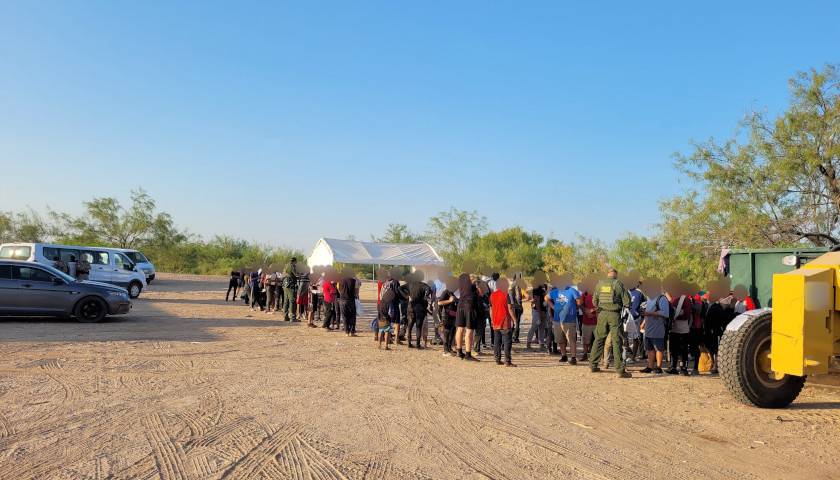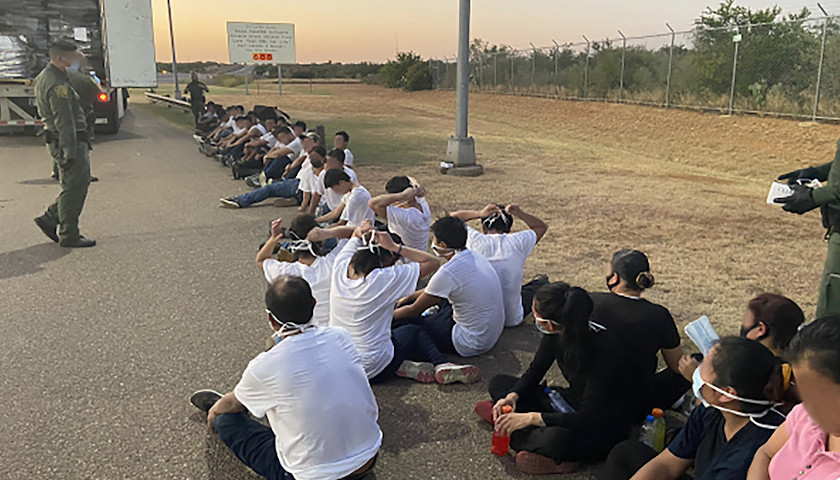by Christopher Roach
Thomas Friedman recently said something interesting: “The euphoric rampage of Oct. 7 that killed some 1,400 soldiers and civilians has not only hardened Israeli hearts toward the suffering of Gaza civilians. It has also inflicted a deep sense of humiliation and guilt on the Israeli Army and defense establishment, for having failed in their most basic mission of protecting the country’s borders.”
The humiliation and guilt do not seem universal. Our military and defense leadership do not seem to feel any responsibility for the border crisis. They certainly feel no shame for this egregious and ongoing insult to American sovereignty. For them, the military is reserved for events around the globe, even though most of these far-flung campaigns have only a tangential relationship to actual American security.
Our border is completely wrecked, and more than 2 million migrants are likely to arrive this year. Most of these people are poor, low-skilled people from the Third World. They are not likely to contribute much to our country, many will arrive and stay illegally or under fraudulent refugee claims, and they will receive substantial benefits unavailable to millions of struggling Americans. Collectively, this weakens our country.
While our rickety southern border contributes greatly to this state of affairs, the Department of Defense seems to have no interest in actually doing anything to help. They have repeatedly resisted deploying significant assets to augment the U.S. Border Patrol.
Trump received withering criticism from senior members of the U.S. military for his supposed disrespect for the military’s customs and for the suggestion that he might employ them during the nationwide riots in 2020. As part of their aversion to domestic deployment, the military has remained largely indifferent to protecting the border, as if national defense can only be conducted in the nether reaches of the world, many thousands of miles from our country’s borders and our people.
Power Projection vs. National Defense
We do not have a military geared towards territorial defense. We instead have a military devoted to power-projection. It can damage countries and their militaries halfway around the world, and many of its personnel and much of our equipment remains permanently overseas.
Force structure and training have oscillated between preparation for low intensity wars and peer competitors, but the military has devoted very little attention to protecting the country itself from direct threats, whether in the form of an invasion of migrants or from something like a Chinese spy satellite flying over the continental U.S.
This all flows from the dual nature of American Empire. A very smart and anonymous writer, CatGirl Kulak, described how the ruling class’s chief concern is the overseas empire, which leads them to neglect the interior of the nation, along with its people: “Functionally America is an hourglass-shaped empire. It’s really two empires barely connected. It is a 19th century land empire conquered by American settler populace, and it is a 20th century Maritime and global empire conquered by the US Navy and barely closeted communist bureaucrats along with the foreigners they funded. These two empires barely interact . . . The place they meet, the narrow center of this hourglass is Washington DC. . . . Whilst Washington remains completely safe from any threat to its 20th-century Maritime empire… Washington’s 19th-century land empire has it by the throat.”
Washington foreign policy types like to play games of Risk overseas, because they know we have two oceans and a nuclear arsenal to protect us from conventional threats. This sort of power politics is mostly harmless to the ruling class; and, when a war ensues, the people doing the fighting and dying are, in their eyes, a bunch of disposable right-wing hicks from flyover country.
On the other hand, the same ruling class has completely lost its mind about January 6, because this was a rare and extreme nonviolent revolt by the denizens of the Inland Empire, which the Washington D.C. ruling class holds in great contempt, but also greatly fears.
An Invasion By Any Other Name . . .
If we had a wise and patriotic ruling class, this would all look very different. They would protect the interior, because they would understand that the chief consequence of any invasion is not the destruction of military equipment, so much as the threat to national sovereignty and the related threat to the survival and flourishing of a people. As the old joke went, if it wasn’t for the army, we would be speaking German.
But why invade a country conventionally, when the invaders can achieve their goal of lebensraum without the challenge of amassing military forces and planning a military invasion? The scale and long-term consequences of the border crisis far outweighs the official concerns of our defense establishment, like Russo-Ukrainian relations or the Straits of Malacca. But our national leaders do not treat the border crisis as a matter of national survival.
For real countries, particularly in ethnostates like Israel, it is obvious that borders matter, and it is obvious that the military’s job is to protect them, whether from invaders with uniforms or not. Either type of invader presents a threat to life and limb, and both present a threat to a nation and its access to resources.
Unfortunately we have a cosmopolitan leadership class, which lately is not terribly bright, and they are either indifferent to or hostile to the land, the people, and their resources.
The Excuse of Legality
At least part of the military’s aversion to taking responsibility for the migrant invasion comes from the leadership’s understandable desire not to employ the blunt instrument of the U.S. military in the delicate matter of domestic law enforcement. But there are several problems with this excuse.
First, this is not a constitutional requirement; posse comitatus is a mere statute, and whether it is police or military, there are still courts and other constitutional protections afforded to American citizens. Using the military on the border is as American as the Constitution, which provides: “The United States shall guarantee to every state in this union a republican form of government, and shall protect each of them against invasion; and on application of the legislature, or of the executive (when the legislature cannot be convened) against domestic violence.”
Second, the military’s aversion to domestic law enforcement activity is also fairly selective. General Milley clutched his pearls over Trump threatening to invoke the Insurrection Act during an actual insurrection June of 2020, but, even today, the military brags about its role enforcing desegregation orders by bayonet in the 1950s. Similarly, the military, which only months before did not want to put down violent riots, willingly established a “Green Zone” in Washington D.C. protected by thousands of troops around the time of Biden’s inauguration.
The real driver of military aversion to protecting the border is a combination of budgetary concerns and the perception that doing empire things overseas is more valorous and higher status than rounding up illiterate, unarmed Central Americas along the Rio Grande. The military leadership tends to kiss up to the ruling class, who are more interested in the overseas, maritime empire. On this matter, the civilian and uniform leadership’s worldviews have converged, and this also explains why the military has become more politically correct in recent years.
A True Department of Defense
The divorce of the military from border defense—an artifact of World War II and the subsequent Cold War—should be considered more critically. No one saw a conflict between (the Reconstruction-era) Posse Comitatus statute and the deployment of the army in forts along the border with Mexico to deter and punish incursions. The Army’s decades-long contribution to border security culminated in Blackjack Pershings’ 1916 punitive expedition against Pancho Villa. Thereafter, the military focused almost exclusively on overseas threats from nation-states, particularly in Europe, mostly ceding its role at the border to a law enforcement agency in 1924 with the creation of the Border Patrol.
The Border Patrol and its budget is tiny compared to the military. This says a lot about the ruling class’s priorities. The government is moving mountains and spending hundreds of billions to impose its will abroad, while tolerating anarchy on its border and slow, but continuous, degradation of the quality of life at home.
Our military and political leaders must adapt to the times. The reluctance to use the military on the border comes from the obsolete paradigm of a world where nation-states have a “monopoly on force.” In the pre-Westphalian past, as well as the present, many historically transformative invasions were not undertaken by uniformed militaries and may not have even been particularly violent.
The first English colonists in North America came as religious farmers seeking peace. At first, they had peaceful relations with native tribes, which we celebrate on Thanksgiving. Similarly, the Barbarian Invasions of the Roman Empire were as much an immigration phenomenon as they were a military invasion. Whether violent or not, the result in each of these cases was the same: displacement of the existing people along with their way of life.
Today, in many parts of the country, you need to know Spanish just to get by. Other unassimilated ethnic pockets exist throughout the country. These shifts in linguistic unity signal a broader disunity, the fruits of massive, unrestrained, and unassimilable levels of immigration.
The history of defeated nations should provide a ready source of wisdom: these nations and their armies lose when they are preparing to fight the last war. Militaries and nations also lose when the leadership and the military are no longer aligned with the people and their interests.
Today, a new type of invasion is manifest. And it calls for a new type of leadership, which puts America first. These circumstances also demand a new type of military, one at home on the border.
– – –
Christopher Roach is an adjunct fellow of the Center for American Greatness and an attorney in private practice based in Florida. He is a double graduate of the University of Chicago and has previously been published by The Federalist, Takimag, Chronicles, the Washington Legal Foundation, the Marine Corps Gazette, and the Orlando Sentinel. The views presented are solely his own.
Photo “Illegal Immigrants” by Acting Chief Patrol Agent Juan G. Bernal.




